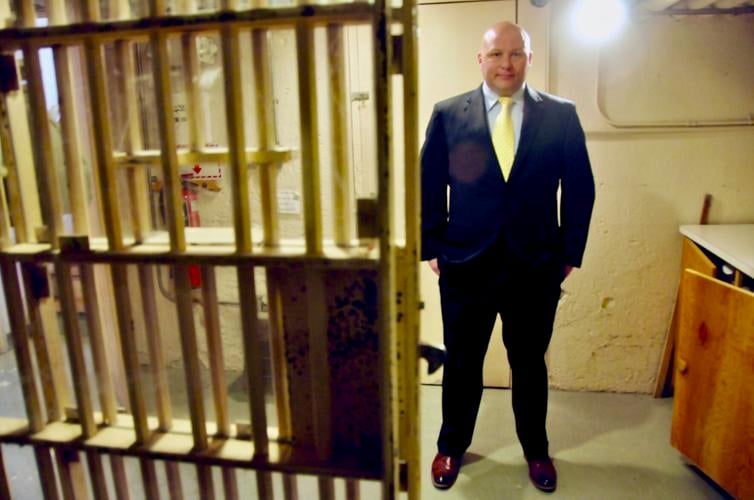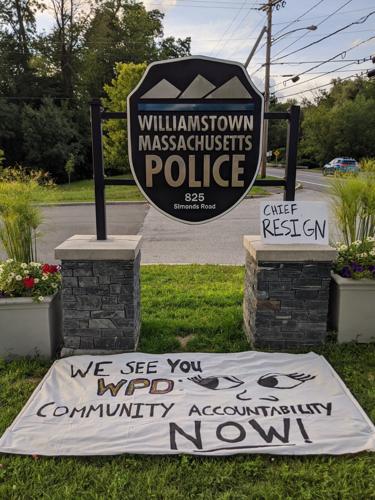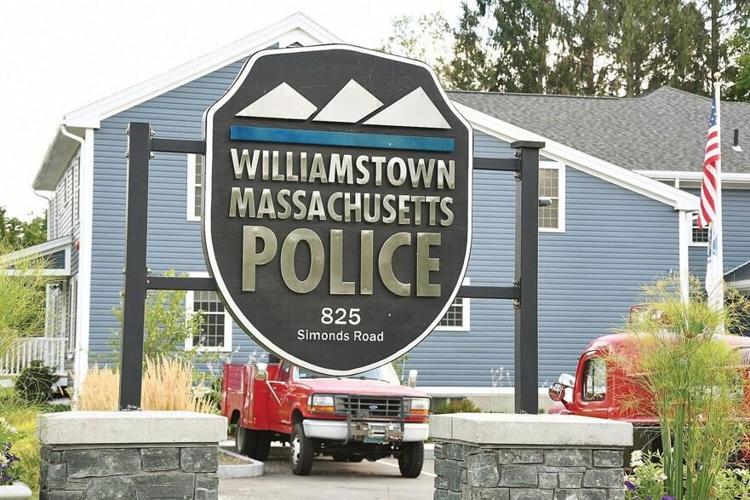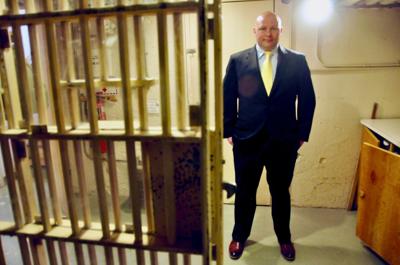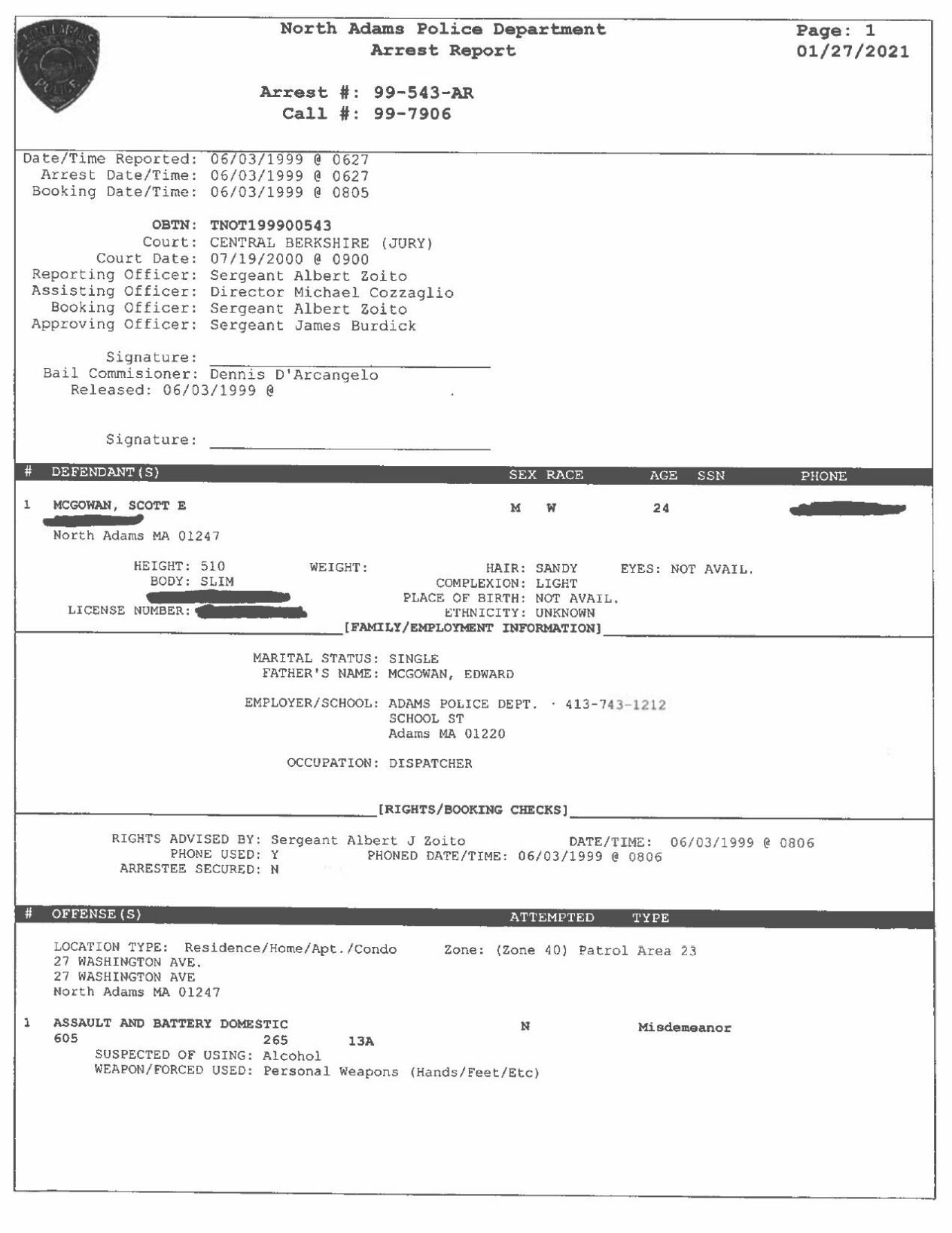WILLIAMSTOWN — The Williamstown sergeant whose claims of harassment and bias within his department spurred doubts about local policing, and led the police chief and town manager to resign, is now himself under scrutiny.
Sgt. Scott E. McGowan was removed from active duty this week after he was named in an employee complaint. “I can confirm that Sgt. McGowan has been placed on paid administrative leave pending review of a personnel matter,” said Town Manager Jason Hoch.
Hoch said he directed Acting Chief Michael Ziemba on Monday to put McGowan on leave. Hoch declined further comment.
Separately, an investigation by The Eagle finds that McGowan had run-ins with area police departments, including being charged in a domestic assault and battery case in North Adams, on dates that overlapped with some of the incidents he flagged in the U.S. District Court lawsuit he filed last summer against two top Williamstown officials.
That lawsuit shook Williamstown, spurring community calls for an independent review of police policy and marathon Zoom meetings that tested Select Board members. The suit ultimately toppled its two targets — Police Chief Kyle Johnson and Hoch.
The town’s confidential internal review of the complaint against McGowan will focus attention on his role within the Williamstown Police Department, which he made a central issue in both a Massachusetts Commission Against Discrimination complaint in November 2019 and in the federal lawsuit he filed last August against Hoch and Johnson.
In his legal actions, McGowan cited a handful of incidents that painted a picture of sexual harassment and racial bias within the department, casting himself as the victim, through actions instigated by Johnson and, his lawsuit claimed, abetted by Hoch as the chief’s supervisor since 2015.
If made public, the new review could affect the longtime sergeant’s public image as a well-intentioned whistleblower. Meantime, a separate outside review of the department, by attorney Judy A. Levenson, has been commissioned by the Select Board.
Williamstown has been struggling with issues of race and policing as a result of the Black Lives Matter movement, as well as allegations broug…
Johnson resigned Dec. 14, after a Nov. 9 apology to the town did not resolve public distrust. Hoch will leave in late April, citing fallout from McGowan’s allegations and the loss of public trust. The suit was withdrawn Dec. 15.
David A. Russcol, McGowan’s attorney, said Friday that his client has not been informed about the nature of the employee complaint that compelled Hoch to have him placed on leave. Russcol confirmed that a complaint led to the action and suggested that it could be part of what the lawsuit itself cast as a pattern of job retaliation.
“He is simply in the dark about why he has been placed on leave,” Russcol said by email, in response to questions.
“Sgt. McGowan is obviously concerned that a complaint may have been made in retaliation for his lawsuit against the town. He is also concerned that the town reacted to the complaint by immediately placing him on leave, when that has not been the town’s response to complaints in the past,” Russcol wrote.
Past cases
On June 3, 1999, McGowan was arrested on a charge of domestic assault and battery (a misdemeanor) after his girlfriend at the time said he threw her against a wall in her apartment’s kitchen in North Adams, knocking objects down. According to a North Adams police report, the woman said McGowan then pushed her to the floor and sat on top of her, after waking her in the middle of the night to ask about nude photos he’d found of her.
Police reports say the woman told an officer that McGowan had woken her up and started yelling about the photos. She was crying and shaking, the police report said, and struggled to catch her breath. The woman suffered a cut on her left elbow and showed signs of redness around her neck, the report said.
The woman later applied for and received a restraining order against McGowan. “She stated there was physical abuse and that is why she wanted the order,” Officer Craig A. Bush wrote in a June 1999 incident report obtained by The Eagle.
The investigating officer, Sgt. Albert Zoito, wrote in a report that when interviewed early in the morning of June 3, 1999, McGowan had a “strong odor of alcohol” on his breath. He told police that the victim had awoken him at his apartment that night and yelled at him and struck him. He told police that he held the woman on the floor so she could calm down.
McGowan was later charged with assault and battery, and a year after the incident, on July 19, 2000, McGowan admitted to facts sufficient to warrant a guilty finding and the case was continued without a finding. He was ordered to receive private counseling. McGowan was 24 at the time and working as a dispatcher at the Adams Police Department while holding the status of special officer in Williamstown, a title used for junior, part-time employees.
J. Michael Kennedy Jr., the Williamstown police chief at the time of the North Adams domestic assault and battery, said that when he turned the reins of the department over to incoming Chief Arthur Parker, he provided a file on what he perceived to be McGowan’s missteps. That file, Kennedy said in an interview with The Eagle, “made it abundantly clear to me that this man (McGowan) is in the wrong business.”
Kennedy said that in his view, McGowan was at the time “a major liability” to the department due to his conduct and “was always screwing up.” Kennedy stepped down before McGowan’s plea was entered in the North Adams assault and battery case in 2000, but said he had limited McGowan’s use by the department as a special police officer due to concerns about his conduct.
“I wanted his gun and his badge immediately if not sooner,” Kennedy said. “I didn’t get it. I had to send a guy to get it. Guess who issued that handgun? Me.”
Despite Kennedy’s recommendation, Parker put McGowan to work as a full-time officer in 2002 and promoted him to sergeant in 2004.
Russcol, McGowan’s attorney, said that despite the assault and battery case, his client was promoted from a special officer to a full-time officer, then to the position of sergeant.
“The charge was ultimately dismissed,” Russcol said. “The Town of Williamstown was fully aware of the court case and the circumstances of the incident. … [McGowan] was also made the Williamstown Police Department’s sole designated investigator of serious crimes. He has served professionally under multiple chiefs and multiple town managers. He does not feel that the incident impacts his ability to do his job in any way.”
The assault and battery charge involving McGowan will be examined in the months ahead by the Brady Review Board created last year by Berkshire District Attorney Andrea Harrington, according to Andrew McKeever, her spokesman.
That board reviews whether past conduct by police officers needs to be disclosed to defense attorneys. McKeever said inclusion on the so-called Brady list, named for a Supreme Court case, is not a judgment about an officer’s fitness to serve.
Other incidents
Early on Nov. 20, 2009, while working as a Williamstown sergeant, McGowan was stopped by a Vermont state trooper in Bennington, Vt., after being seen weaving on the road, changing lanes and disregarding two stop signs. McGowan handed the trooper not only his vehicle registration but his Williamstown Police Department ID card, according to the Bennington District Court proceeding.
A employee complaint against Sgt. Scott E. McGowan led Williamstown Town Manager Jason Hoch on Monday to direct that McGowan be placed on a pa…
Nearly two hours after the initial 1:18 a.m. stop, McGowan was given a breath test to check for inebriation. His blood alcohol level came in at 0.065, under the legal limit of 0.08, according to news coverage of the case, which cited district court records. McGowan was charged with negligent operation of a motor vehicle, pleaded guilty, was fined $500 and his right to drive in Vermont was temporarily suspended.
In Williamstown, Chief Johnson penalized McGowan with a one-day suspension, saying of his sergeant, “He put himself in a situation he should not have been in. I felt, given these circumstances, his conduct was unbecoming to an officer.”
Johnson declined Friday to comment for this story.
One earlier incident, in Williamstown, is memorialized in police narratives and reports filed by both the Williams College security department and the WPD.
Late on the night of April 9, 1997, a college security official asked Williamstown police to respond to a car that had driven up a walkway at Thompson Chapel, damaging the lawn. “Operator MV may be intoxicated,” the request said, nothing that the security official had identified the driver as McGowan.
Officer Kevin Garner responded. In his report, Garner said he recognized the red Jeep as belonging to McGowan, who at the time had been a part-time officer for nearly two years. Garner said that while he smelled alcohol on McGowan’s breath, “he didn’t appear to be under the influence.”
The report says McGowan acknowledged that he shouldn’t have driven up the sidewalk. After conferring with the college security officer, Garner said he returned to speak with McGowan. “He became argumentative,” Garner wrote. “Asking me if I had ever done something stupid when I was his age. Told him yes, but big difference was that I wasn’t a special police officer like he was. … More arguing, told him to go home.”
When asked, in light of the three cases reviewed by The Eagle, Russcol denied that McGowan has a problem with alcohol. He noted that the Vermont case showed his blood alcohol content to be under the legal limit.
“He has no record of alcohol-related incidents in over 10 years,” Russcol said. “Sgt. McGowan’s lawful consumption of alcohol has not impacted his service as a law enforcement officer.”
Union role
Before both the MCAD complaint and lawsuit were withdrawn, attorneys for Williamstown did file paperwork suggesting that McGowan’s behavior had created divisions within the department.
A filing in the MCAD case noted that McGowan had been removed as president of the Williamstown Police Association, the union, by a unanimous vote of its members.
That action, according to the filing, left McGowan isolated from others. “Since that time, the Complainant had rarely spoken with many of his fellow officers, essentially giving them the cold shoulder and creating tension and drama within the department,” the filing said.
Russcol said Friday that the union vote that removed McGowan from the presidency came after Johnson, the former chief, “falsely told the members of the union that Sgt. McGowan was calling Johnson a racist.”
He disputed the notion that McGowan is isolated from his fellow police officers.
“Some people were not happy that Sgt. McGowan, in good faith, filed a lawsuit alleging violations of state and federal law. But he continues to be an important and effective member of the department.”
He said McGowan has been helping Ziemba, the acting chief, revamp the department’s policies and procedures. “He has continued to investigate serious crimes within the Town of Williamstown and perform all his duties as directed by Acting Chief Ziemba. Anyone who questions his effectiveness is misinformed.”
Williamstown’s steps to defend Johnson and Hoch in U.S. District Court would likely have included challenges to McGowan’s depiction of life inside the department. The withdrawal of the litigation prevented that from happening.
In a statement two weeks after the suit was filed Aug. 12, the Select Board indicated that while the case was pending, they would refrain from addressing McGowan’s history with the force — at his attorney’s request.
Russcol, the board said Aug. 27, objected to the release of any “negative information, allegations or implications about Mr. McGowan” and said doing so would be seen “as further evidence of unlawful retaliation.”


